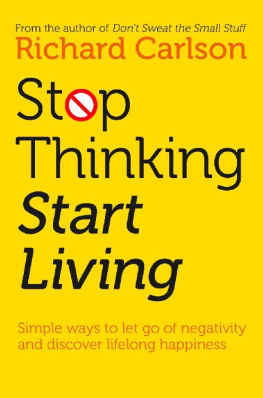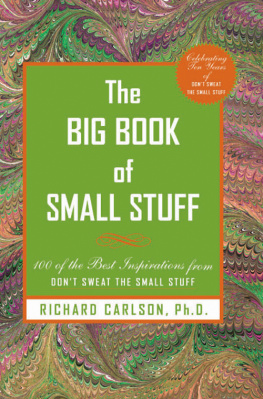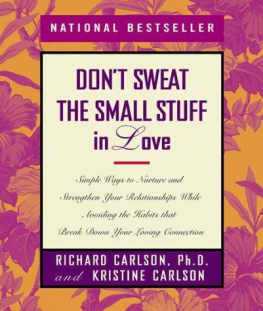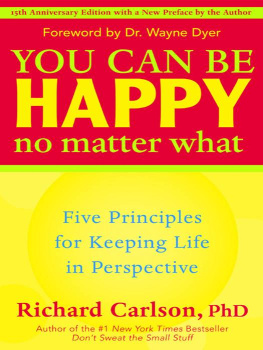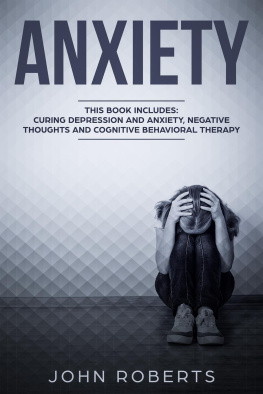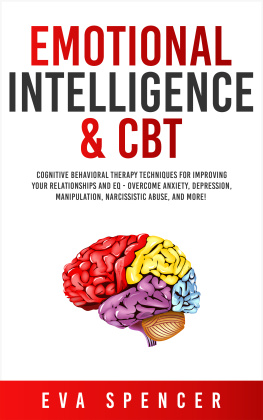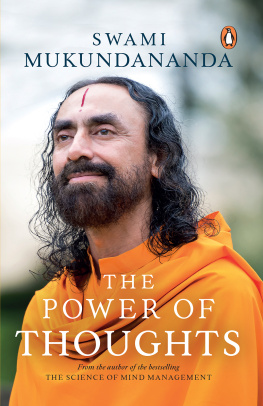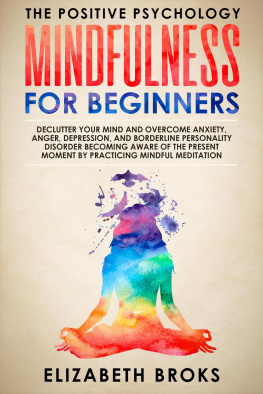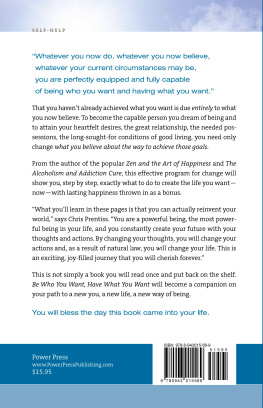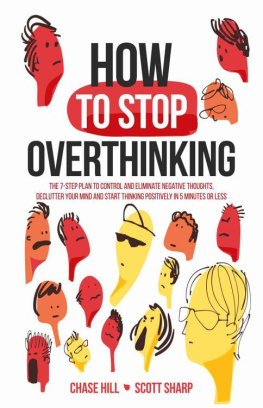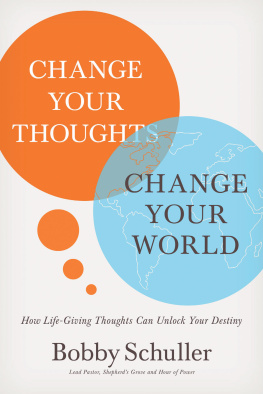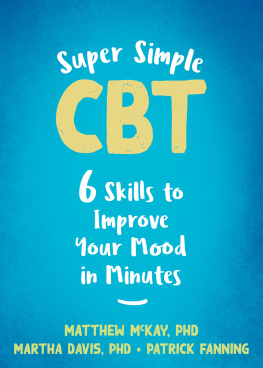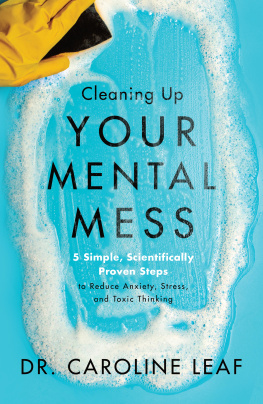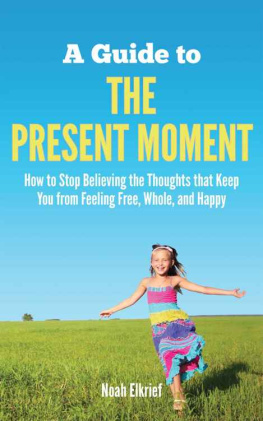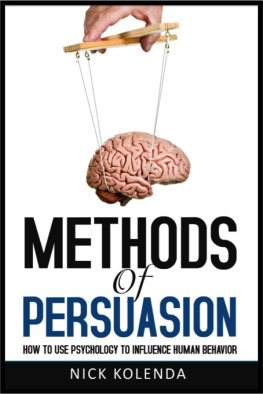HarperElement
An imprint of HarperCollins Publishers
1 london Bridge Street
London SE1 9GF
www.harpercollins.co.uk
and HarperElement are trademarks of
HarperCollins Publishers Limited
Originally published as You Can Feel Good Again by Thorsons 1993
First published by Thorsons 1997
Published by Element 2003
This edition published by HarperElement 2012
FIRST EDITION
Richard Carlson 1993
Richard Carlson asserts the moral right to be identified as the author of this work
A catalogue record of this book is available from the British Library
All rights reserved under International and Pan-American Copyright Conventions. By payment of the required fees, you have been granted the non-exclusive, non-transferable right to access and read the text of this ebook on-screen. No part of this text may be reproduced, transmitted, down-loaded, decompiled, reverse engineered, or stored in or introduced into any information storage and retrieval system, in any form or by any means, whether electronic or mechanical, now known or hereinafter invented, without the express written permission of HarperCollins ebooks.
Paperback ISBN: 9780722535479
Ebook edition August 2012 ISBN: 9780007383092
Version 2016-10-21
Contents
I respectfully ask that you try to forget everything you have ever been told about unhappiness, pessimism and depression where these feelings come from, how serious they are, and how difficult they are to overcome. Try to forget about all the attempts you have made that have failed and all the approaches that promised results but did not deliver. Even though I am going to explain how you can begin to feel better today, I dont ask you to believe me with blind faith. Instead, I ask that you use your own common sense when evaluating what you are about to read. By the time you finish this book I believe you will not only feel better, but also understand exactly why most approaches failed you before.
The way to get the most out of this book is to approach it with an open mind. See whether it makes sense to you and if it sounds like something that you already know intuitively. Some of what I propose will be quite different from what you have been exposed to before. Dont let this be an obstacle to getting the help you deserve. Keep in mind that if what you have already learned was the answer you were looking for, you wouldnt be reading this book today. You would be out enjoying your life.
The information given here is different because it represents a new understanding in the field of mental health. It doesnt build on other approaches you may already be familiar with. If you can digest and take to heart the information in this book, you will feel better right away. There is very little effort involved; all you have to do is understand what you read on an intuitive level and make a gentle effort to put your understanding into practice. As you will see, I dont offer any fancy techniques or any sophisticated psychological theories to sift through. What I offer you is a simple yet profound commonsense-based understanding of mental health and happiness that really works, and that can be implemented immediately. I have seen people who have been unhappy or depressed for as many as 30 years walk away from my office feeling better than they can ever remember. And whats more, the good feeling you will learn to tap into sticks with you.
I am a stress-management consultant who teaches people some very simple facts about their own internal functioning what makes them tick and what makes them fall apart. The principles that I teach are generic, meaning they apply to everyone. I receive referrals from therapists around the country who have seen their clients rid themselves of depression as a result of what I teach. As people learn about the habitual processes that contribute to their own misery, and the ways that they use their own minds to sabotage their lives, they quickly discover a natural and relatively effortless way to escape the grips of unhappiness and lifelong pessimism.
My approach is based on a set of principles known as the Psychology of Mind.therapists, consultants and educators, with spectacular results! The methods you will learn have been extrapolated from these principles in a way that is geared towards freeing you from unhappiness.
Many professionals now teaching this approach have come to believe that a majority of the more conventional therapeutic approaches available today to treat unhappiness can actually make matters worse instead of better. This is not to say that there arent excellent, well-qualified therapists practising traditional therapy there most certainly are. What you may discover, however, is that many of the practices that therapists currently use tend to fuel an already depressed state. Clients are directed to get in touch with their most negative feelings and analyse their pasts in order to transcend their present situations. They are asked to study, if not relive, their childhood as well as their more recent past so that they can better understand the psychological damage that was inflicted on them.
One of the consistent problems I have seen in working with clients who have given up on traditional therapy is that each time a new trauma is uncovered, the client is in effect starting over again. There are always new sessions designed to get to the bottom of each additional issue and to explore the negative feelings that go along with recounting them. Each specific issue entails more negative feelings to explore. Many therapists insist that unless people deal head-on with their negative experiences and unconscious drives, they will be miserable forever. You must keep in mind, when deciding whether traditional therapy makes sense to you, that the therapists who tell you this are almost always paid by the hour!
In defence of therapists, I dont think Ive ever met one who would intentionally keep a client longer than they felt was absolutely necessary. Nevertheless, there is a certain conflict of interest to be very cautious of: if you get better, the therapist loses you as a client! If you have been in therapy for an extended period of time and are still unhappy, you may want to reconsider your treatment. Is more of the same really going to help? Is going deeper into your pain and suffering really going to help you experience joy? Is getting in touch with more negativity really going to make you feel less negative? I doubt it. History shows us that this route often doesnt work.
Does this mean that therapy is useless? No. I would say, however, that success in therapy depends far more on the mental health and happiness of the therapist than it does on reliving past traumas and pain. A skilled therapist who is also a happy, vibrant person will most certainly be able to pass along at least some of her happiness almost regardless of the specific approach she uses.
One of the most striking observations that many people make when attending a Psychology of Mind seminar or when they have a private session with a consultant, is that the people who teach Psychology of Mind are very happy people themselves. I have come to believe that unless a person is happy himself, its very difficult, if not impossible, to teach someone else to be happy. How can an unhappy person, who is caught up in personal problems, teach an already unhappy person to feel joy? I feel grateful to be able to say that I am, indeed, a happy person, and I hope the feeling I bring to life will touch you as you read this book.

